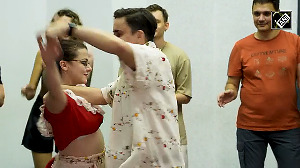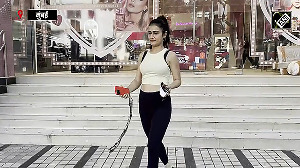But a teenager refereeing the biggest match on the football calendar? Unthinkable.
There will not be a single referee under the age of 30 at the 2006 World Cup next month, and the vast majority will be well into their 40s.
The reasons are all too clear when you see pictures of players angrily remonstrating with referees, while fans scream abuse from the stands and pundits pore over television pictures looking for the most marginal errors.
"It's all about pressure," says Markus Merk, a 44-year-old German referee. "And the ability to deal with that pressure comes from experience.
"When you referee your first match it's not going to be a high-profile one with 20,000 people there. But you need spirit as well."
FIFA gathered 44 referees with that blend of character and experience at a series of tests in Frankfurt in March and the number was cut to 23 at the final selection meeting on March 31.
The 32-year-old Australian Mark Shield has the honour of being the youngest referee at the tournament, while Russia's Valentin Ivanov, born on July 4 1961, is the oldest, at the very edge of the age limit of 45.
DEATH THREATS
Two of the more recent high-profile members of the profession will be missing from the June 9 to July 9 tournament.
Italian Pierluigi Collina, the five-times world referee of the year with the distinctive bald pate, resigned from the Italian Association of Referees last year and would in any case have been over the age limit this time.
| |||||||||||
"I don't think there'll ever be another Collina," Slovakia's Lubos Michel, who along with Merk is now one of the most respected and high-profile referees in the world game, told Reuters at the Frankfurt workshop.
"But there are a lot of top-quality referees around who were maybe forgotten before, including my friend Markus Merk. He's a great referee."
FIFA president Sepp Blatter recently called the referees the 33rd team at the World Cup and they can expect their task to be tougher than ever this time, with the authorities especially keen for them to clamp down on violent conduct.
"The most important thing now is to eliminate foul play from the game," Michel says. "The game must be fair."
To reinforce the team ethic among the referees at the World Cup, all 23 officials, plus their assistants, will stay at the same hotel on the outskirts of Frankfurt when they are not in action.
They have all been required to pass an English test to make sure they can chat to one another during those quiet periods.
COMMON LANGUAGE
FIFA also had good communication in mind when it chose to group referees with assistants from the same country, or at least from the same Confederation and with a common native language.
The task for FIFA now is to make sure that everyone -- the referees, the players, the coaches and the fans -- are well informed about the directives issued on how the laws should be interpreted for the World Cup.
Officials have been told to clamp down harder than ever on time-wasting, elbowing, diving and serious foul play.
The worry is that the new interpretation of the laws will see a spate of red and yellow cards in early World Cup matches but FIFA is not concerned.
"No one will be able to say they weren't informed about the changes," said FIFA general secretary Urs Linsi. "The coaches all got the latest information at the recent meeting in Duesseldorf and when the teams arrive in Germany for the World Cup they'll receive a visit from FIFA with all the latest information."
The new directives certainly have the backing of the referees, who are eager to prevent the game getting any more violent.
"We have a duty to protect players who are there to entertain people," Michel said.
"Tripping from behind is now a red-card offence but players will find other ways to stop people. Body checking is like in ice hockey now and must be stopped."








 © 2025 Rediff.com -
© 2025 Rediff.com -